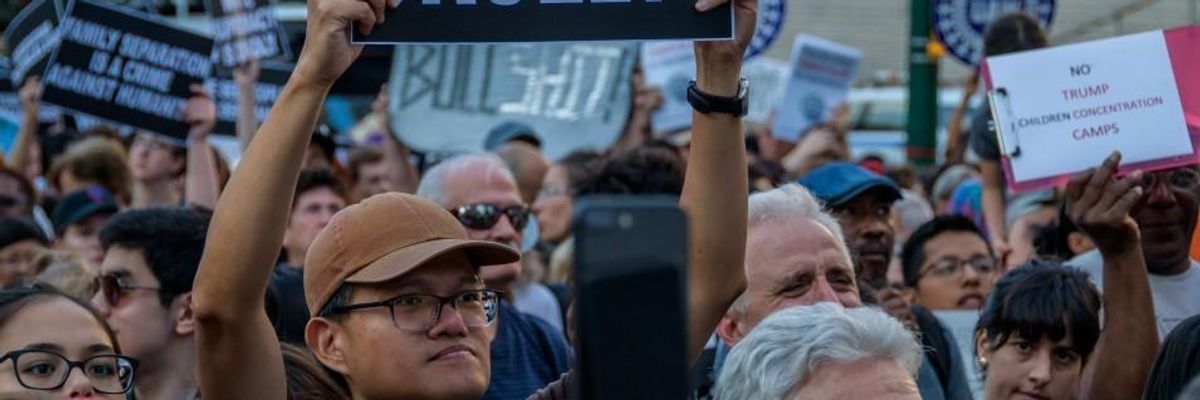
Thousands of advocates, activists, and community members flooded the streets at Foley Square in New York City on July 12, 2019. (Photo: Erik McGregor/Pacific Press/LightRocket via Getty Images)
Betraying 'Bedrock Principle' of Due Process, Supreme Court Allows Fast-Tracked Deportations
"This decision means that some people facing flawed deportation orders can be forcibly removed with no judicial oversight, putting their lives in grave danger."
The ACLU warned Thursday that people's lives could be "in grave danger" following the Supreme Court's ruling allowing for fast-tracked deportations of certain asylum seekers.
The ruling was 7-2, with Justices Sonia Sotomayor and Elena Kagan dissenting.
CNN reported:
Currently, undocumented immigrants who are caught within 100 miles of a land border and within 14 days of arrival are subject to an expedited removal process and can be ordered removed without further hearing or review. If the individual seeks asylum, however, he or she is provided additional screening before an asylum officer, a supervisory officer, and an immigration judge to determine whether the person has a credible fear of persecution or torture if returned to his or her home country.
The high court's ruling means that if the asylum seeker fails that initial screening, they can face "expedited removal."
"While aliens who have established connections in this country have due process rights in deportation proceedings, the court long ago held that Congress is entitled to set the conditions for an alien's lawful entry into this country and that, as a result, an alien at the threshold of initial entry cannot claim any greater rights under the Due Process Clause," Justice Samuel Alito wrote for the majority.
Sotomayor warned in her dissent, "Taken to its extreme, a rule conditioning due process rights on lawful entry would permit Congress to constitutionally eliminate all procedural protections for any non-citizen the Government deems unlawfully admitted and summarily deport them no matter how many decades they have lived here, how settled and integrated they are in their communities, or how many members of their family are U.S. citizens or residents."
As NBC News reported,
The ruling was a defeat for Vijayakumar Thuraissigiam of Sri Lanka, who was detained by federal agents 25 yards north of the U.S.-Mexico border. He said that as a member of his home country's Tamil minority, he faced harm if returned and had once been kidnapped and beaten, though he said he wasn't sure why he was assaulted. When his asylum claim was rejected, he sought help in federal court by filing a habeas corpus petition, invoking the Constitution's guarantee against unlawful detention. But the Supreme Court said the option wasn't open to him.
Justices Stephen Breyer and Ruth Bader Ginsburg, as USA Today reported, "agreed with the judgment but said they would have applied it only to Thuraissigiam's claim."
The decision drew sharp rebuke from ACLU attorney Lee Gelernt, who argued the case.
"This ruling fails to live up to the Constitution's bedrock principle that individuals deprived of their liberty have their day in court, and this includes asylum seekers," said Gelernt. "This decision means that some people facing flawed deportation orders can be forcibly removed with no judicial oversight, putting their lives in grave danger."
The ruling is a win for the President Donald Trump, who's made anti-immigrant policies a centerpiece of his administration.
An Urgent Message From Our Co-Founder
Dear Common Dreams reader, The U.S. is on a fast track to authoritarianism like nothing I've ever seen. Meanwhile, corporate news outlets are utterly capitulating to Trump, twisting their coverage to avoid drawing his ire while lining up to stuff cash in his pockets. That's why I believe that Common Dreams is doing the best and most consequential reporting that we've ever done. Our small but mighty team is a progressive reporting powerhouse, covering the news every day that the corporate media never will. Our mission has always been simple: To inform. To inspire. And to ignite change for the common good. Now here's the key piece that I want all our readers to understand: None of this would be possible without your financial support. That's not just some fundraising cliche. It's the absolute and literal truth. We don't accept corporate advertising and never will. We don't have a paywall because we don't think people should be blocked from critical news based on their ability to pay. Everything we do is funded by the donations of readers like you. Will you donate now to help power the nonprofit, independent reporting of Common Dreams? Thank you for being a vital member of our community. Together, we can keep independent journalism alive when it’s needed most. - Craig Brown, Co-founder |
The ACLU warned Thursday that people's lives could be "in grave danger" following the Supreme Court's ruling allowing for fast-tracked deportations of certain asylum seekers.
The ruling was 7-2, with Justices Sonia Sotomayor and Elena Kagan dissenting.
CNN reported:
Currently, undocumented immigrants who are caught within 100 miles of a land border and within 14 days of arrival are subject to an expedited removal process and can be ordered removed without further hearing or review. If the individual seeks asylum, however, he or she is provided additional screening before an asylum officer, a supervisory officer, and an immigration judge to determine whether the person has a credible fear of persecution or torture if returned to his or her home country.
The high court's ruling means that if the asylum seeker fails that initial screening, they can face "expedited removal."
"While aliens who have established connections in this country have due process rights in deportation proceedings, the court long ago held that Congress is entitled to set the conditions for an alien's lawful entry into this country and that, as a result, an alien at the threshold of initial entry cannot claim any greater rights under the Due Process Clause," Justice Samuel Alito wrote for the majority.
Sotomayor warned in her dissent, "Taken to its extreme, a rule conditioning due process rights on lawful entry would permit Congress to constitutionally eliminate all procedural protections for any non-citizen the Government deems unlawfully admitted and summarily deport them no matter how many decades they have lived here, how settled and integrated they are in their communities, or how many members of their family are U.S. citizens or residents."
As NBC News reported,
The ruling was a defeat for Vijayakumar Thuraissigiam of Sri Lanka, who was detained by federal agents 25 yards north of the U.S.-Mexico border. He said that as a member of his home country's Tamil minority, he faced harm if returned and had once been kidnapped and beaten, though he said he wasn't sure why he was assaulted. When his asylum claim was rejected, he sought help in federal court by filing a habeas corpus petition, invoking the Constitution's guarantee against unlawful detention. But the Supreme Court said the option wasn't open to him.
Justices Stephen Breyer and Ruth Bader Ginsburg, as USA Today reported, "agreed with the judgment but said they would have applied it only to Thuraissigiam's claim."
The decision drew sharp rebuke from ACLU attorney Lee Gelernt, who argued the case.
"This ruling fails to live up to the Constitution's bedrock principle that individuals deprived of their liberty have their day in court, and this includes asylum seekers," said Gelernt. "This decision means that some people facing flawed deportation orders can be forcibly removed with no judicial oversight, putting their lives in grave danger."
The ruling is a win for the President Donald Trump, who's made anti-immigrant policies a centerpiece of his administration.
The ACLU warned Thursday that people's lives could be "in grave danger" following the Supreme Court's ruling allowing for fast-tracked deportations of certain asylum seekers.
The ruling was 7-2, with Justices Sonia Sotomayor and Elena Kagan dissenting.
CNN reported:
Currently, undocumented immigrants who are caught within 100 miles of a land border and within 14 days of arrival are subject to an expedited removal process and can be ordered removed without further hearing or review. If the individual seeks asylum, however, he or she is provided additional screening before an asylum officer, a supervisory officer, and an immigration judge to determine whether the person has a credible fear of persecution or torture if returned to his or her home country.
The high court's ruling means that if the asylum seeker fails that initial screening, they can face "expedited removal."
"While aliens who have established connections in this country have due process rights in deportation proceedings, the court long ago held that Congress is entitled to set the conditions for an alien's lawful entry into this country and that, as a result, an alien at the threshold of initial entry cannot claim any greater rights under the Due Process Clause," Justice Samuel Alito wrote for the majority.
Sotomayor warned in her dissent, "Taken to its extreme, a rule conditioning due process rights on lawful entry would permit Congress to constitutionally eliminate all procedural protections for any non-citizen the Government deems unlawfully admitted and summarily deport them no matter how many decades they have lived here, how settled and integrated they are in their communities, or how many members of their family are U.S. citizens or residents."
As NBC News reported,
The ruling was a defeat for Vijayakumar Thuraissigiam of Sri Lanka, who was detained by federal agents 25 yards north of the U.S.-Mexico border. He said that as a member of his home country's Tamil minority, he faced harm if returned and had once been kidnapped and beaten, though he said he wasn't sure why he was assaulted. When his asylum claim was rejected, he sought help in federal court by filing a habeas corpus petition, invoking the Constitution's guarantee against unlawful detention. But the Supreme Court said the option wasn't open to him.
Justices Stephen Breyer and Ruth Bader Ginsburg, as USA Today reported, "agreed with the judgment but said they would have applied it only to Thuraissigiam's claim."
The decision drew sharp rebuke from ACLU attorney Lee Gelernt, who argued the case.
"This ruling fails to live up to the Constitution's bedrock principle that individuals deprived of their liberty have their day in court, and this includes asylum seekers," said Gelernt. "This decision means that some people facing flawed deportation orders can be forcibly removed with no judicial oversight, putting their lives in grave danger."
The ruling is a win for the President Donald Trump, who's made anti-immigrant policies a centerpiece of his administration.

